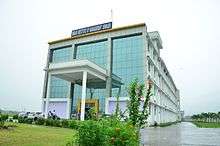Indian Institute of Management Sirmaur
| भारतीय प्रबंध संस्थान सिरमौर | |
 | |
| Type | Public business school |
|---|---|
| Established | 4 September 2015 |
| Location |
Paonta Sahib, Sirmaur, Himachal Pradesh, India Coordinates: 30°26′30″N 77°38′45″W / 30.441545°N 77.645818°W |
| Website |
www |
The Indian Institute of Management Sirmaur (IIM Sirmaur) is a public business school in Sirmaur, Himachal Pradesh, India. It is one of the twenty Indian Institutes of Management.
Background
The institution started the first batch of its Post Graduate Program (PGP) in management from 4 September 2015.[1][2] The institute has started[3] groundwork for its activities under the guidance and mentorship of the Indian Institute of Management Lucknow.
Infrastructure
The temporary campus of IIM Sirmaur is at Himachal Institute of Technology, Paonta Sahib, Sirmaur. Paonta Sahib is an industrial town in the south of Sirmaur district and is well connected to Dehradun, Chandigarh, Shimla, Delhi etc.[4] National Highway 7 passes through the town. Two hundred acres of land has been acquired in Dhaulakuan for the permanent campus of the institute.
Administration
In February 2017, Dr. Neelu Rohmetra of University of Jammu was appointed as the director of Indian Institute of Management Sirmaur.[5]
Academic programmes
IIM Sirmaur offers Post Graduate Programme, which is equivalent to MBA. This is a two-year, regular, full-time residential programme. Admission to the PGP course of IIM Sirmaur is conducted each year through Common Admission Test (CAT).
The second batch of IIM Sirmaur were in Ljubljana, Slovenia for an "International Immersion Program–2017" program jointly organized and facilitated by the International Center for Promotion of Enterprises (Slovenia), IIM Lucknow and IIM Sirmaur. Over a period of 30 days, the participants were introduced to specific components of EU based practices in the area of Monetary and Fiscal policy, Multilateral Trade System, Foreign Exchange Markets, International Communication, people-centered development, Eco-technology, Circular economy, Leadership and PPP. The students were also exposed to some of the development reforms and programs being implemented in Slovenia, EU.
The industrial-institutional visits (Port of Koper, Pipistrel, United Nations Vienna and Austrian Parliament) and weekend trips to places within and beyond Slovenia supplemented the classroom learning and helped the students to learn and appreciate the cultural and socioeconomic aspects of life in Europe.
References
- ↑ http://timesofindia.indiatimes.com/city/lucknow/IIM-L-launches-website-of-IIM-Sirmaur/articleshow/47712919.cms
- ↑ http://articles.economictimes.indiatimes.com/2015-01-07/news/57791613_1_iims-hrd-ministry-odisha
- ↑ http://www.hindustantimes.com/punjab/classes-for-first-post-graduate-batch-at-iim-sirmour-begins/story-r7C5D7mcPyTNlzeAAJFIBJ.html
- ↑ http://www.thehindubusinessline.com/news/education/search-panel-for-iim-directors/article8911918.ece
- ↑ "Prof Neelu Rohmetra appointed Director IIM Sirmaur". Daily Excelsior. 11 February 2017. Retrieved 21 March 2017.